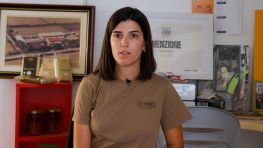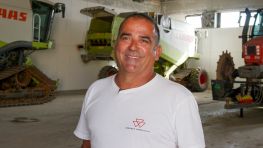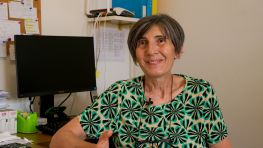 Rosalia Vacca and the Dream of…
Rosalia Vacca and the Dream of… Scribante Lauretta
The dream of a more natural world.
Lauretta, student at the ITS course "Agroalimentare Riso e Cereali Vercelli", is invited to carry out her internship at the Cascina Teglio farm in Rovasenda. The reality in which she is immersed, made of constant commitment to improve, not only the quality of the products but also the environment in which they are grown, fascinates and engages her. The experience gained in this area fills Lauretta with pride and makes her feel part of a big family. A small testimony that allows us to better understand the desire of citizens to be an active part in the production processes.
Video table of contents
- Presentation.
- The food technician course in Vercelli.
- Being close to nature: less beautiful but better.
- My classmates in conventional rice mills.
- I have always loved the contact with the earth.
- I ate rice and drank wine since I was a child: panissa with seasonal vegetables.
- Risotto tastes better if the raw material is good.
- Grandma used to say that less beautiful is more good.
- The photo of the frogs to make it clear that things are really different here: an experience that changed me.
- I live a few kilometers from here and I did not know Cascina Teglio: now I will introduce this world of bio-truth. All collaborators give their best.
Interview information
Country: IT
Region: Piemonte
City: Rovasenda
Locality: Cascina Teglio
Lauretta Scribante
Date of birth: 12-03-1962
City: Gattinara
School: High school or Secondary
Languages: Italiano
Document by: Luca Ghiardo
Video by: Luca Ghiardo
Created: 11-05-2021
Questo video fa parte del seguente archivio
Rice stories
Rice stories
Food is a fundamental resource for man and his health, both through the supply of nutrients and the ability to embody traits of human culture that play a leading role in our well-being.
Over time, each territory has built original ways in which to relate to the fruits of its land, enriching them with rituals, symbolic meanings and culinary customs. Much of these relationships have been lost following the years of the economic boom, with the exodus from the countryside to urban centers, with the advent of agriculture for mass production and ultimately with the globalization of markets and the consequent impoverishment of the heritage of biodiversity and ethnodiversity.
The purpose of this archive is to collect evidence relating to the main rice production area in Europe, that is the Po Valley, and to investigate, through the analysis of textual sources and testimonies collected in the field, both what survives of this heritage, and the ways in which which has evolved and reached us, paying particular attention to the explicit and implicit links that bind food and health.






